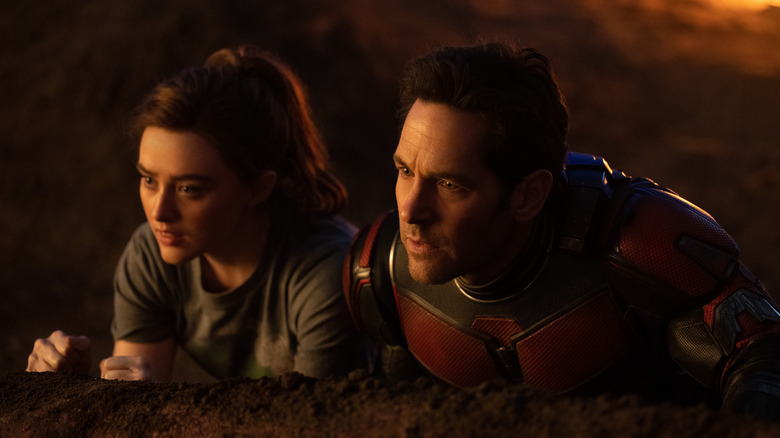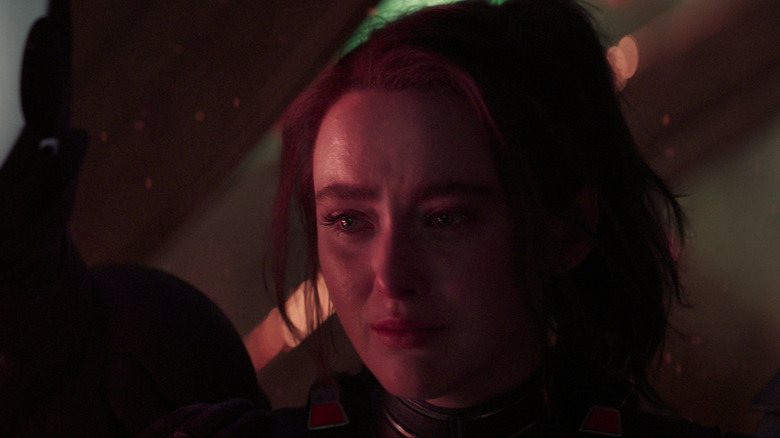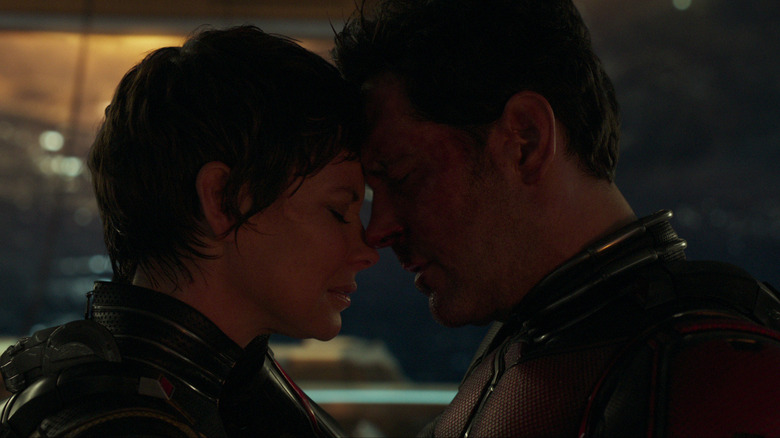
This post contains spoilers for "Ant-Man and The Wasp: Quantumania."
"The Blip" is such a dismissive name for what might be the most significant event in the Marvel Cinematic Universe. At the conclusion of the Russo Bros. 2018 film "Avengers: Infinity War," the genocidal warlord Thanos (Josh Brolin) has accumulated six magical gems that allowed him to, essentially, do anything he desired. Being hellbent on death, Thanos willed half of the universe's entire population into oblivion. Perhaps to be dramatic, Thanos snapped his fingers to enact his wish, leading MCU fans to refer to the mass murder as "the Snap." A sizeable part of me wishes the MCU had ended at that moment. The actions of the heroes attracted the attention of a madman, their formation of a freelance military wasn't clever enough to stem the spread of militant death, and their story ends with eradication. It's tragic, it's bleak, and evil wins. How gloriously sad it could have all been.
In the inevitable sequel, "Avengers: Endgame" from the following year, five years had passed before the Avengers found a way to resurrect all the people who had been killed, and kill Thanos ... twice. I suppose with a name like "Avengers," they're not very well going to come up with a more elegant fate for Thanos than mere execution.
They also wouldn't think about the long-term ramifications for the planet after a five-year gap with half its population missing, followed by their abrupt return. The MCU has largely looked the other way when it comes to the five-year gap, called "the Blip," more often watching the superhero mayhem rather than the civilians.
Peyton Reed's new film "Ant-Man and the Wasp: Quantumania," at the very least, addresses one problem the Blip would have caused: massive homelessness.
Post-Blip Society

Prior to the events of "Infinity War," Ant-Man/Scott Lang (Paul Rudd) was the father to a young girl named Cassie. Ant-Man, having shrunk down to subatomic size, was trapped that way for five years before a friendly rat managed to pull him back to ordinary scale. By his perception, though, he was only gone for a few hours. He emerged with Cassie now a teenager and would have to rekindle his relationship with her. Their reconnection would have made interesting fodder for a film unto itself.
By "Quantumania," the teenage Cassie, played by Kathryn Newton, is following in her father's footsteps, occasionally getting in trouble with the law, and secretly operating her own Ant-Suit. Cassie, however, is no petty criminal, usually getting arrested during righteous protests. It's only a single line of dialogue, but Cassie mentions that her hometown of San Francisco is now seeing an uptick in police brutality toward the city's homeless population: a lot of people were left without homes thanks to the Blip.
If half the world's population vanished, one can see several practical scenarios forming in regard to lodging. With more rooms now open, the world might have benevolently allowed everyone to finally have a place to stay. In a bitterer scenario, landlords would find themselves short rent, have to default on their property payments, and demolish their own buildings. Either way, the number of actual livable apartment units in the world would be diminished in five years. Then, suddenly, everyone was back. Where are 3.5 billion people now supposed to live?
"Quantumania," sadly, is not about the homelessness problem that the Avengers helped create. It's more about fighting a microscopic tyrant in a fantasy kingdom.
Are Heroes Righteous?

The fact that none of the Avengers seem to be working on the homelessness problem caused by the Blip points out that the world may still be in shambles. How are food supplies being handled? How about employment? If everything seems fine in MCU civilian life, does the presence of a miracle metal like Vibranium have anything to do with it? If so, how? Are the various world governments more or less united than before? "Black Panther: Wakanda Forever" seems to imply that most Earth governments are just as petty and warmongering as before. This sci-fi-loving filmgoer would have adored a more expansive exploration of the Blip's tragic and ongoing aftermath. Surely it's far more complicated than "Everyone was gone, but now they're back."
It also brings up a vital ethical conundrum that the MCU would never dare touch. At the beginning of "Endgame," Iron Man (Robert Downey, Jr.) points out that their very name, the Avengers, is predicated on horrors happening beforehand, and it's their job to punish the wicked. They do not, it seems, act in a preventative measure, usually only springing into action when violently facing off against an invading force. That one line tugs at a string in superhero ethics that more or less unravels the concept. In a Saturday morning cartoon/black-and-white universe of superheroes and supervillains, a "might-makes-right" ethic functions simply and dramatically, of course, but in actuality, wouldn't real heroes be more proactive about solving the world's problems at large? Especially if they were responsible? Usually, the Avengers are more concerned about military missions, growing their ranks, and remaining powerful.
So Cassie's arrest at homelessness protests is, in fact, one of the more heroic things a hero can do, post-"Endgame."
Also, it was funny when she shrunk that cop car.
Read this next: The Most Brutal Moments In The MCU Ranked
The post How Ant-Man and The Wasp: Quantumania Continues the Tragic Aftermath of The Blip appeared first on /Film.
0 Comments